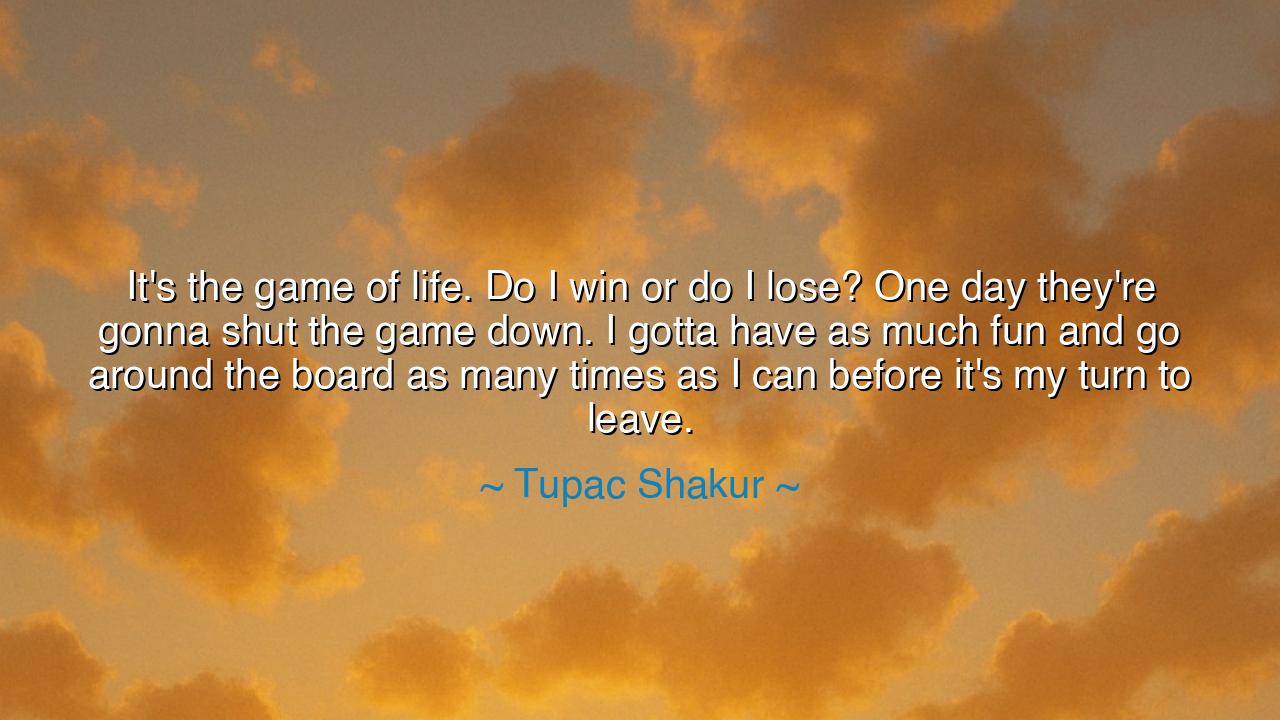
It's the game of life. Do I win or do I lose? One day they're
It's the game of life. Do I win or do I lose? One day they're gonna shut the game down. I gotta have as much fun and go around the board as many times as I can before it's my turn to leave.






"It's the game of life. Do I win or do I lose? One day they're gonna shut the game down. I gotta have as much fun and go around the board as many times as I can before it's my turn to leave." These powerful words from Tupac Shakur offer a profound reflection on life’s impermanence and the human desire to make the most of our limited time. Tupac, through this metaphor of life as a game, captures the uncertainty and fleeting nature of our existence. The quote speaks to the inevitability of death and the choice we all have in how we spend the time between birth and that inevitable moment when the "game" is over. In the brief span we are given, Tupac suggests that it is not just about winning or losing, but about living with purpose, embracing the moments we are given, and experiencing as much of life as we can.
The origin of this perspective can be traced back to the ancient wisdom of Stoic philosophers, who believed that life was fleeting and often unpredictable. Epictetus, for example, wrote that the wise person recognizes that their time is limited and therefore focuses on the things within their control: virtue, wisdom, and purposeful action. In contrast to the distractions of wealth or status, the Stoic focus was on living a life that could be looked back on with contentment, even in the face of inevitable loss. The Stoic emphasis on acceptance of life’s uncertainties mirrors Tupac’s assertion that we should embrace the time we have, understanding that life is a game with unknown rules and an unknown end.
Consider the life of Alexander the Great, whose rise to power seemed destined by fate. At the age of 32, Alexander had already conquered much of the known world, but his death came unexpectedly, leaving the empire he built to be fractured by his generals. Alexander’s story teaches us that even the most successful and powerful figures cannot control the timing of their departure. His life, filled with victories, triumphs, and struggles, offers a reflection of Tupac’s view: we are all players in a vast, unpredictable game, and the measure of success is not only in the goals we achieve but in how we live and experience the journey.
Tupac’s words also resonate with the teachings of Confucius, who emphasized that life’s true worth is found in the way we live, not in the accumulation of wealth or accolades. Confucius believed that to live a virtuous life, one must engage in actions that are meaningful and contribute to the well-being of others. In a sense, Tupac’s desire to have fun and enjoy life reflects a similar belief in finding meaning in the present moment, despite the uncertainties of the future. The game, as Tupac describes, is not solely about winning or losing, but about experiencing each round with joy and passion, making the most of the time on the board before the game ends.
The lesson in Tupac’s words is a call to live life fully, embracing both the joys and challenges that come with it. Life, as he suggests, is an unpredictable game, and we cannot always control the outcome. What we can control is how we approach it. Are we playing with passion, with integrity, and with the knowledge that one day, the game will come to an end? Just as a chess player might strategize each move while knowing the game will inevitably conclude, we too must understand the finite nature of our existence and live with an awareness of both the present and the future.
Consider the story of Nelson Mandela, who spent 27 years in prison fighting for freedom and justice. Upon his release, he did not dwell on the years lost, but instead embraced his newfound freedom with a deep sense of purpose. Mandela’s focus was on creating a future, not on counting the losses of his past. His life was a game that included many setbacks, but his ultimate victory was in the legacy he left behind — a nation transformed, a people liberated. Mandela’s life exemplifies how, in the game of life, what matters most is not always the immediate wins, but the long-term impact of the choices we make and the ways we live and lead.
Tupac’s quote teaches us that the meaning of life is found in our approach to it. It is not about waiting for some final victory or fearing the inevitable end. It is about experiencing each moment, embracing the highs and lows, and moving through life with purpose. Every move we make is part of our own unique game, and as Tupac reminds us, the real victory is found in the way we live, the joy we take in the journey, and the legacy we leave behind.
In applying this wisdom, let us live each day as if we are playing the most important round of the game. Take risks, embrace challenges, and, most importantly, find joy in every moment. Let us focus not on the end, but on how we choose to engage with the present. Life’s depths and mysteries will remain unknown, but by living authentically and with intention, we can ensure that, when the game ends, we have played it to the fullest. Let us remember, as Tupac did, that life is a game — not always won by victories, but by how we play, how we love, and how we live through it all.






AAdministratorAdministrator
Welcome, honored guests. Please leave a comment, we will respond soon